Vinyl flooring is a great way of giving your room a makeover without spending a fortune. And you don’t have to be a DIY expert to handle the installation.
But if you’re contemplating this project yourself, you may be wondering how to ensure your new floor stays put. For that, you’ll need the right type of adhesive.
If you’re not sure what glue to use for vinyl flooring, you’ve come to the right place! We’re going to tell you everything you need to know to carry out a successful project.
Table of Contents
Do you need glue at all?
To begin with, check whether you need to use glue at all. Not all kinds of vinyl flooring require it.
Vinyl plank flooring, for example, often features a click-and-lock design. The edges are beveled so that they snap together without the need for adhesive. But you may still need to use glue around the edges of the floor to hold everything in place.
And even glue-down vinyl flooring may not need separate glue. Some types have a self-adhesive back. You simply remove a film covering to reveal the sticky surface, and press it onto the sub-floor.
But be warned. Self-adhesive floor tiles can sometimes need extra help to stay fixed in place securely. If you’ve got an awkwardly shaped floor and can’t avoid small pieces of vinyl, extra glue may be helpful. Ditto for vertical surfaces like stair risers.
So if you’re sure that glue is required for your project, what kind should you get?
The characteristics of effective vinyl flooring adhesive
Vinyl flooring presents several challenges to an effective adhesive. To start with, it’s flexible. It will bend slightly under pressure – and floors are subject to a lot of pressure. That means that any glue needs to be able to flex with the flooring.
You’ll also want something that’s waterproof. Vinyl flooring usually resists water, so it’s a good choice for bathrooms and kitchens. But any gaps between tiles or planks can allow water to penetrate. So you’ll want an adhesive that won’t be affected by moisture, and will resist mold and mildew.
And you’ll want something that won’t give off toxic chemicals. You’ll be using a lot of glue to hold your floor in place. You don’t want it polluting the air in your home.
Remember to take into account the type of sub-floor to which you’re attaching your vinyl flooring. A product that works brilliantly on concrete may not be as effective on ceramic tiles. Fortunately, there’s a huge range of vinyl adhesives on the market, suitable for bonding to all kinds of sub-floor.
Last but not least, check the bonding time. You want to get the right balance here between a quick bond and one that leaves time for adjustments. You may need to move your vinyl plank or tile slightly as you lay others. A glue that bonds in minutes, rather than seconds, will make that much easier.
Different types of adhesive
Now we know what your glue needs to do. So how do those requirements match up against the different kinds of products out there?
Adhesive comes in three broad categories. These are water based, polyurethane based and acrylic based. Each one has different characteristics. Let’s find out more about them.
Water-based glue
Water-based glues are usually low in VOCS – volatile organic compounds. That means they’re better for the air quality in your home. And they’re often also less damaging to the wider natural environment.
They’re much easier to clean up than many other kinds of glue too. If you spill some as you’re installing your floor, you’ll usually be able to get rid of it without too much trouble.
There is, however, a downside. If water-based glue comes into contact with high levels of moisture, its bond can weaken. So if you have pets or young children prone to spilling liquids on your floor, it may not be the best choice.
Polyurethane based glue
Polyurethane based products are the adhesive of choice for installing wooden floors, but they work well with vinyl too.
They use a substance called isocyanate dissolved in a solvent. This type of glue usually has low levels of VOCs, making it suitable for large scale applications like floors.
Acrylic based glue
Last but not least are acrylic based glues. These bond well with vinyl, won’t be affected by moisture and can withstand changes in temperature. They’re made from resin, and have a similar level of VOCs to polyurethane based glues.
They can, however, be more expensive than other kinds of adhesive.
Best brands of glue for vinyl flooring
The best type of glue for your project will depend on the kind of flooring you’re laying, the type of sub-floor, and the environment you’re working in. What will work well for one project may be less effective in another.
Having said that, there are some products with a strong track record for working well with vinyl floors. Here are some of the best-known brands it’s worth checking out.
1. Roberts 6300 Pressure Sensitive Vinyl Adhesive
Roberts’ 6300 adhesive is specifically designed to cope with changes in pressure. That makes it a great choice to fix vinyl flooring securely in place.
It’s suitable for use on a wide range of sub-floors too. It will bond effectively to concrete, plywood, terrazzo and other vinyl tiles, as long as they’re free from wax.
It’s solvent free, and has low levels of VOCs. And it contains GoldGuard, an antimicrobial preparation that keeps mold and mildew at bay.
2. DAP Weldwood Multi-purpose Floor Adhesive
DAP’s adhesive is latex-based, so it’s nice and flexible. And while it’s strong, it also allows planks and tiles to be repositioned easily as you’re laying them.
It’s water resistant, and has a low level of VOCs. There’s no strong odor either, and it can be cleaned up if you accidentally spill some. The texture is thick and gloopy, and it’s best used with a trowel for spreading.
Note, though, that this is very sticky. Wear gloves, and be prepared to spend some time cleaning up afterwards. A drop of dishwashing liquid and some cooking oil will get rid of spills.
3. Henry 430 Clear Thin Spread Floor Tile Adhesive
Henry’s floor tile adhesive is clear, allowing you to see any lines you’ve drawn on your tiles or planks. It will work well with either vinyl or asphalt tiles.
It grabs well and quickly, but it does have a long curing time. Expect it to take around 24 hours for your floor to be completely bonded. The precise time will depend on environmental conditions.
Make sure you apply only a thin layer, and use it in a well ventilated area. The odor here is pretty strong.
4. Roberts 2057 Superior VCT Adhesive
Roberts 2057 is designed to securely fix vinyl composite floor tiles in position. It will work well with sub-floors made from a range of materials, including concrete, other vinyl tiles, and APA rated plywood. Just make sure that there are no sealants or waxes on the sub-floor.
You can apply the glue with a brush, roller or trowel. Once on, it will cure in 24 hours. The bond is very strong – it will withstand regular mopping and cleaning without weakening. But until it’s set, you’ll be able to lift and reposition your tiles as needed.
Note, however, that the consistency of this glue is rather loose – think yogurt rather than peanut butter. That means it requires careful application. But take your time with it, and it will give you good results.
5. Red Devil Tile Paste Adhesive
Red Devil’s tile adhesive is designed to work on tiles made from everything from ceramic to plastic – and yes, vinyl.
It comes in a large tube, with a medium consistency that’s easy to apply. It won’t stain or discolor your tiles, and it will resist mold and mildew. That makes it a good choice for kitchen or bathroom floors, where moisture levels will be higher. And it’s easy to clean up if you have any accidental spills.
The VOC content is low too, so you won’t have to worry about breathing in toxic chemicals. And it’s strong enough to be used on vertical as well as horizontal surfaces. Just leave it overnight for the glue to set.
6. SureGrip Seam and Repair Adhesive
If you’re looking for an adhesive to repair tears in vinyl tiles, SureGrip’s Seam and Repair is a good bet. The small tube is ideal for tackling small fixes on floors and walls.
It’s very easy to use – just apply to the tear and hold in place for between 15 and 20 seconds.
Just bear in mind that this is designed for smaller repairs, and isn’t suitable for use on large areas. If you’re looking for a glue to secure your whole floor, it’s not the right choice.
Ready to start your project?
We hope our review of what glue to use for vinyl flooring has helped you as you plan your project.
When making your choice, remember to check that the glue will work with your subfloor, as well as the vinyl. And check the VOC content of the product too. You’ll be using a lot of it, and any toxic chemicals can seriously impair the air quality in your home.
Whatever glue is right for your project, we wish you well as you lay your new floor!
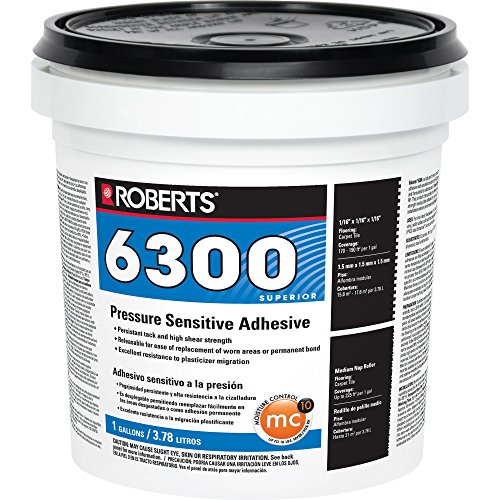





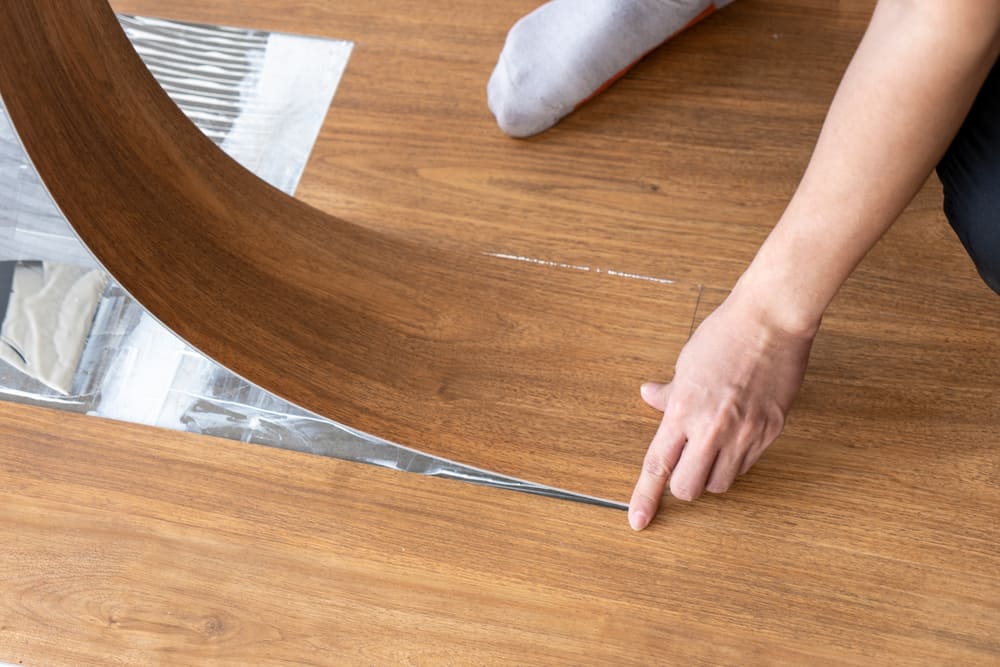
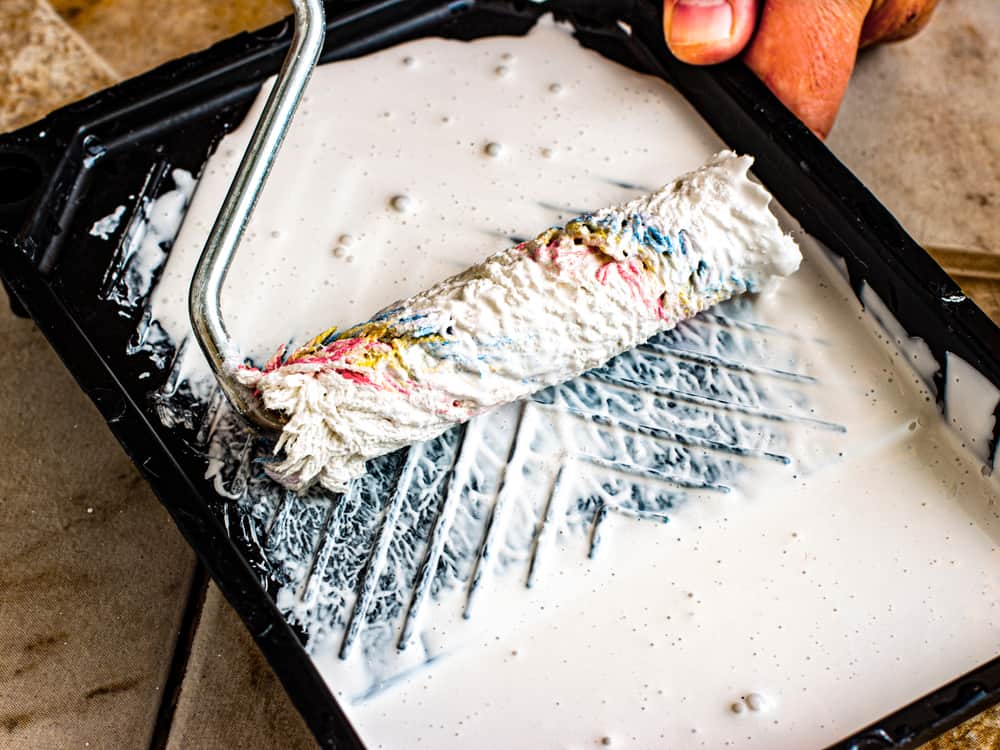
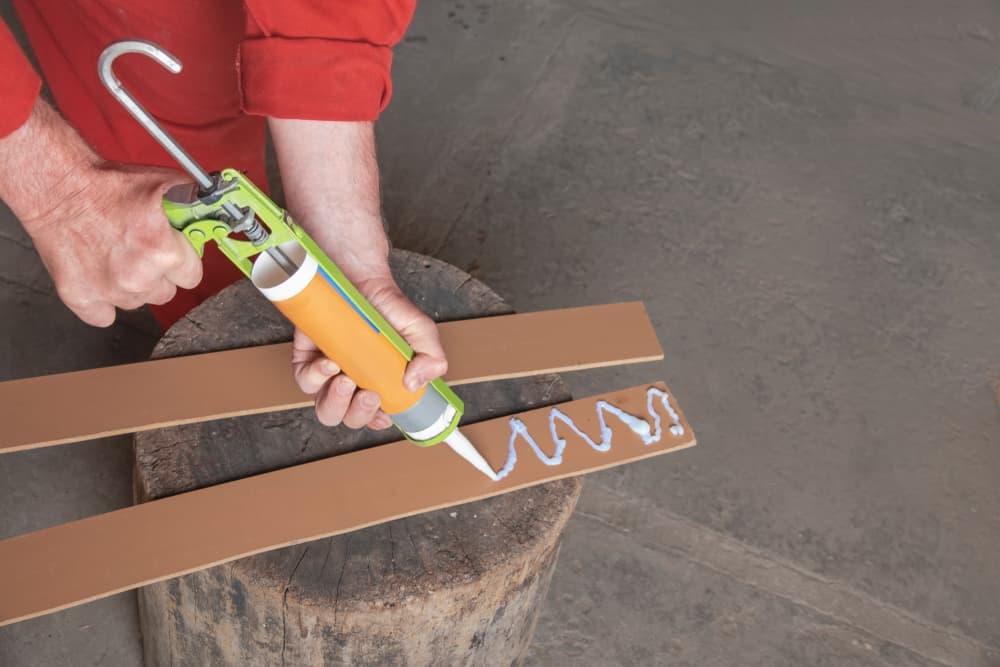
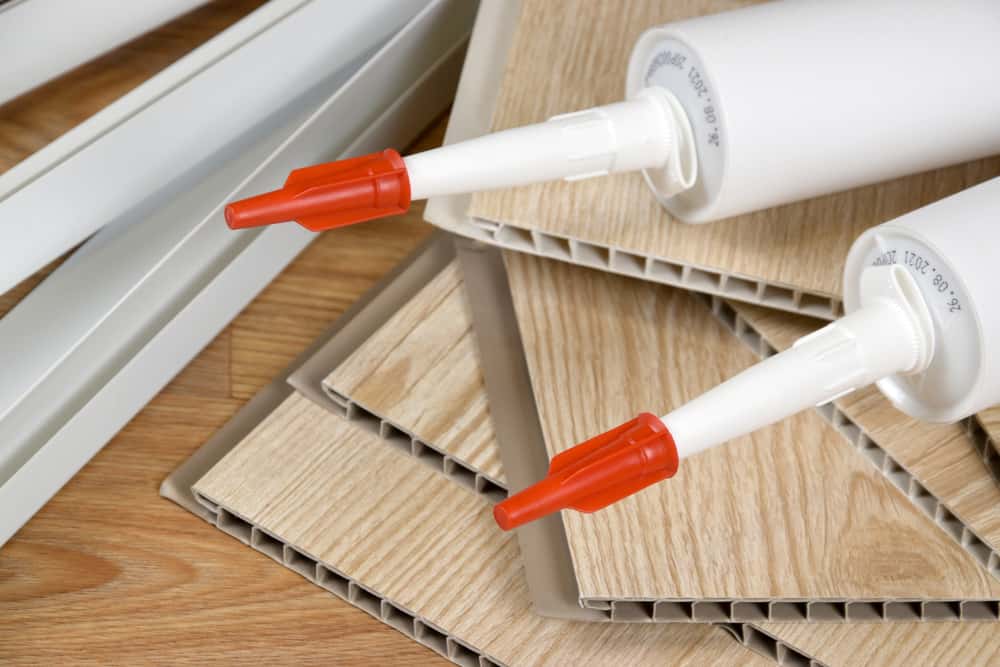
Such A Great Blog. Thank U For Sharing Useful Information.
This Article Really Amazing And So Much Helpful For Me. In fact, I found the information I was looking for in your article.
It’s really helpful. I have benefited from reading your article. Thank you very much.
I am planning to install my floor in a van and will be laying a commercial grade vinyl garage floor (g-coin) over a High Density Polyurethane sub-floor (Coosa Composite Board). Since both surfaces are impermeable, traditional adhesives won’t work. Can you recommend one that will?